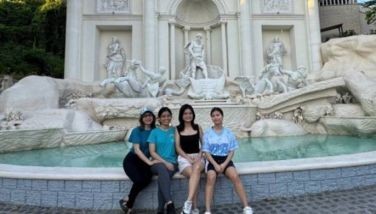If you want to meet Pinoys, go to ‘Bustling Batha’ in old Riyadh
September 23, 2002 | 12:00am
RIYADH, Saudi Arabia – The popular guidebook, Riyadh Today, 2002-2003, published by the Chamber of Commerce and Industry, actually recommends the opposite course of action.
On page 103, this handbook distributed to clients at posh hotels like the Riyadh Sheraton or the Riyadh Palace speaks of "Bustling Batha: The Heartbeat of Riyadh."
For the highfalutin’ and travellers or tourists not inclined to rub shoulders with real people, of course, there are the glittering high-rises of Olaya street, with upmarket boutiques and department stores like Harvey Knicks, Debenhams, the Kingdom Center mall and other snazzy emporia. On the other hand, both the guidebooks and our Embassy staffers will tell you, Batha is the true "heartbeat of Riyadh".
The Chamber of Commerce warns, however: "The first trip, for the timid, should avoid Thursday and Friday. This is, of course, the weekend, and thousands of expatriate workers from the Indian subcontinent and the Philippines jam the whole of Batha, meeting their friends for a chat over tea or coffee or just ‘hanging out,’ making any walking tour a ‘shoulder to shoulder‘ event."
This caution was enough to send us straight to Batha last Friday afternoon (which, to Muslims, is the equivalent of Sunday afternoon – after the noontime prayers).
We grabbed a taxi at the hour of "Asr" (afternoon prayer time, as Muslims reckon it) or about 3:15 p.m., since the shops open at 4 p.m. We arrived into a market scene of noise and chaos: cars, taxicabs, farm trucks and minibuses honking their horns, rattling over potholes and across a clattering overpass, the voices of the multitude gathered there adding to the din.
The buildings, many of them over 40 years old, are grubby and dingy. One building front proclaims: "MANILA Plaza." A gaggle of black-robed women in the usual cover-all abayas turned out to be Filipina nurses from a city hospital.
Everywhere, there were huddles of Pinoys, chatting, or just eyeing the passers-by. We entered the "MANILA" center and on the second level, up the escalators, we found the "Silver Fingers" store, which sell our Philippine newspapers – mostly Philippine STAR. Pilipino STAR Ngayon, and Philippine Daily Inquirer. The newspapers, salesmen Pablo H. Vergara and Monib Moganan told us, arrive two days late by air. The STAR and PDI sold for five Saudi Riyals each (about a dollar fifty), while our Tagalog Pilipino STAR went for four Riyals, or just over a buck. The newspapers sold very well, the two Filipino salesmen said.
When Inquirer Publisher Isagani Yambot, who was with me, however, opened his newspaper, he found many photos splashed with black ink. The same was true of the STAR, but the worst hit of all was our Pilipino STAR in which all those boobsy and sexy movie and TV stars had been inked out, except for their eyes and hair. The censors here are very energetic with the blackpaint brush, eradicating every published inch of skin which might, upon being seen, arouse sinful passions. Thirty copies each of our three major dailies arrive and sell out every time.
A floor above, there were two competing barber shops doing a rush business. One had five Filipino barbers snipping merrily away, while waiting customers gossiped on a bench outside. Opposite it was the even larger "Regal Salon", this time with eight Filipino tonsorial artists cutting away, almost in synch with each other.
Both salons advertise: "Professional Hair Styling". Our OFWs get their regular haircut at six Riyals per - - - or just under two dollars. (In the US, it would have cost ten bucks there.)
Many of the shopkeepers and sales managers at the souqs and stores are either Italian or Pakistani. Since our 260,000 OFWs – including computer specialists, engineers, doctors, nurses, as well as hotel personnel and other professionals – are apparently their biggest customers, most of them have picked up Tagalog phrases like "mura ito", or "hindi mahal", "barato ‘yan", "tamang-tama ang presyo, kabayan", etc.
Mohammad Laglaf, a Saudi who runs "Jewellery King: Sales & Buy Valuable Metal & Precious Stone" (sic) says his wife is a Filipina, so he’s offering his kababayans the "best price". (Visa and MasterCard, and the local SPAN credit card accepted.)
Three floors up is the "Express Padala Philippine Remittance" center, run by Equitable PCI Bank. The Senior Asst. Manager is Dick C. Mendoza, a very personable gentleman who runs the Middle East Operations, Kingdom of Saudi Arabia.
There are queues of Filipinos waiting to remit their money home.
A sign declares: "Customeer Service" (where the extra "e" came from I don’t know)." It asserts: "MABUHAY," then quotes the currency exchange rates. The dollar to peso is P52.15. The Riyal to peso is PHP13.80.
Outside are the snack bars and restaurants. Their names are familiar: "KAMAYAN," "Joni’s" "Barrio Fiesta," etc. The snack bars sell halo-halo, puto, kuchinta, lumpia, and so on.
The "KAMAYAN" menu is very comprehensive. You can get "Beef Kare-Kare" for Saudi Riyals 10 per dish. "Maya-Maya Sinigang" for SR 12. "Nilagang Baka" for SR. 10. (Remember, the rate of exchange is SR 3.75 per US dollar.)
You can get "Nilagang Baka" from the glass-enclosed counter for SR 10. Adobong Pusit is SR 10. Higado is SR 10. Lumpiang Shanghai goes for SR 8. (Rice costs SR 2 a plate.) Kambing Kaldereta is SR 12. Ampalaya con Karne costs SR 10. A "Budget Meal" which includes Bopis, assorted meat, soup, etc. can be had, steaming hot, for SR 10. All you need is Riyals to get a delicious taste of "home-cooking". The budget meal includes a free bottle of water or Pepsi.
So, here we are. In a "Little Filipinas" carved out by our overseas heroes and heroines (as we sometimes condescendingly or in hyperbolic fashion call them)! The heat is awful, but they’ve grown used to it. Some have been here for ten to 12 years. One or two I’ve met for 20 to 22 years. The latter could call Saudi Arabia "home", but they speak of returning to the RP someday to retire.
Our 900,000 Pinoys and Pinays here, laboring industriously in the diaspora, still have, from what I’ve seen and heard, the Philippines in their hearts.
On page 103, this handbook distributed to clients at posh hotels like the Riyadh Sheraton or the Riyadh Palace speaks of "Bustling Batha: The Heartbeat of Riyadh."
For the highfalutin’ and travellers or tourists not inclined to rub shoulders with real people, of course, there are the glittering high-rises of Olaya street, with upmarket boutiques and department stores like Harvey Knicks, Debenhams, the Kingdom Center mall and other snazzy emporia. On the other hand, both the guidebooks and our Embassy staffers will tell you, Batha is the true "heartbeat of Riyadh".
The Chamber of Commerce warns, however: "The first trip, for the timid, should avoid Thursday and Friday. This is, of course, the weekend, and thousands of expatriate workers from the Indian subcontinent and the Philippines jam the whole of Batha, meeting their friends for a chat over tea or coffee or just ‘hanging out,’ making any walking tour a ‘shoulder to shoulder‘ event."
This caution was enough to send us straight to Batha last Friday afternoon (which, to Muslims, is the equivalent of Sunday afternoon – after the noontime prayers).
We grabbed a taxi at the hour of "Asr" (afternoon prayer time, as Muslims reckon it) or about 3:15 p.m., since the shops open at 4 p.m. We arrived into a market scene of noise and chaos: cars, taxicabs, farm trucks and minibuses honking their horns, rattling over potholes and across a clattering overpass, the voices of the multitude gathered there adding to the din.
The buildings, many of them over 40 years old, are grubby and dingy. One building front proclaims: "MANILA Plaza." A gaggle of black-robed women in the usual cover-all abayas turned out to be Filipina nurses from a city hospital.
Everywhere, there were huddles of Pinoys, chatting, or just eyeing the passers-by. We entered the "MANILA" center and on the second level, up the escalators, we found the "Silver Fingers" store, which sell our Philippine newspapers – mostly Philippine STAR. Pilipino STAR Ngayon, and Philippine Daily Inquirer. The newspapers, salesmen Pablo H. Vergara and Monib Moganan told us, arrive two days late by air. The STAR and PDI sold for five Saudi Riyals each (about a dollar fifty), while our Tagalog Pilipino STAR went for four Riyals, or just over a buck. The newspapers sold very well, the two Filipino salesmen said.
When Inquirer Publisher Isagani Yambot, who was with me, however, opened his newspaper, he found many photos splashed with black ink. The same was true of the STAR, but the worst hit of all was our Pilipino STAR in which all those boobsy and sexy movie and TV stars had been inked out, except for their eyes and hair. The censors here are very energetic with the blackpaint brush, eradicating every published inch of skin which might, upon being seen, arouse sinful passions. Thirty copies each of our three major dailies arrive and sell out every time.
A floor above, there were two competing barber shops doing a rush business. One had five Filipino barbers snipping merrily away, while waiting customers gossiped on a bench outside. Opposite it was the even larger "Regal Salon", this time with eight Filipino tonsorial artists cutting away, almost in synch with each other.
Both salons advertise: "Professional Hair Styling". Our OFWs get their regular haircut at six Riyals per - - - or just under two dollars. (In the US, it would have cost ten bucks there.)
Mohammad Laglaf, a Saudi who runs "Jewellery King: Sales & Buy Valuable Metal & Precious Stone" (sic) says his wife is a Filipina, so he’s offering his kababayans the "best price". (Visa and MasterCard, and the local SPAN credit card accepted.)
Three floors up is the "Express Padala Philippine Remittance" center, run by Equitable PCI Bank. The Senior Asst. Manager is Dick C. Mendoza, a very personable gentleman who runs the Middle East Operations, Kingdom of Saudi Arabia.
There are queues of Filipinos waiting to remit their money home.
A sign declares: "Customeer Service" (where the extra "e" came from I don’t know)." It asserts: "MABUHAY," then quotes the currency exchange rates. The dollar to peso is P52.15. The Riyal to peso is PHP13.80.
The "KAMAYAN" menu is very comprehensive. You can get "Beef Kare-Kare" for Saudi Riyals 10 per dish. "Maya-Maya Sinigang" for SR 12. "Nilagang Baka" for SR. 10. (Remember, the rate of exchange is SR 3.75 per US dollar.)
You can get "Nilagang Baka" from the glass-enclosed counter for SR 10. Adobong Pusit is SR 10. Higado is SR 10. Lumpiang Shanghai goes for SR 8. (Rice costs SR 2 a plate.) Kambing Kaldereta is SR 12. Ampalaya con Karne costs SR 10. A "Budget Meal" which includes Bopis, assorted meat, soup, etc. can be had, steaming hot, for SR 10. All you need is Riyals to get a delicious taste of "home-cooking". The budget meal includes a free bottle of water or Pepsi.
So, here we are. In a "Little Filipinas" carved out by our overseas heroes and heroines (as we sometimes condescendingly or in hyperbolic fashion call them)! The heat is awful, but they’ve grown used to it. Some have been here for ten to 12 years. One or two I’ve met for 20 to 22 years. The latter could call Saudi Arabia "home", but they speak of returning to the RP someday to retire.
Our 900,000 Pinoys and Pinays here, laboring industriously in the diaspora, still have, from what I’ve seen and heard, the Philippines in their hearts.
BrandSpace Articles
<
>
- Latest
- Trending
Trending
Latest





























